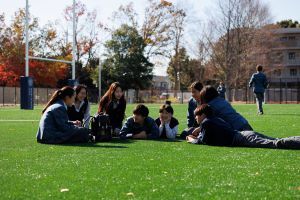Education Solutions for the Internationally Mobile Family
In an increasingly connected world, more families are finding themselves on the move – whether chasing professional opportunities, embracing new cultural experiences, or navigating global uncertainty. For many of these globally mobile households, frequent relocations have become a way of life. While this nomadic lifestyle offers rich rewards, it also brings a unique set of challenges, especially when it comes to providing children with continuity, stability, and a sense of belonging.

This article is taken from the Summer 2025 issue of
Think Global People magazine
View your copy of the Summer 2025 issue of Think Global People magazine.Visit Rugby School Japan's Featured School Page
As parents seek educational solutions that can keep pace with their global lifestyle, many are asking: how can we support our children’s development amid regular changes in location? This article explores the rise of globally mobile families, the complex decisions they face, and how the right school can offer far more than just academic consistency – it can offer a home away from home.
The Rise of the Internationally Mobile Family
International mobility is becoming a defining feature of modern life. Millennials and Gen Z, in particular, are leading the charge, drawn to flexible lifestyles that prioritise experiences over possessions.Whether working remotely, studying abroad, or pursuing personal and professional growth, a growing number of individuals and families are embracing a mobile way of life.The digital nomad movement – once a fringe concept – has rapidly expanded, with projections suggesting the number of digital nomads could reach 1 billion by 2035. In fact, according to 76% of Gen Zers and Millennials, the new American Dream for young Americans is to live and work anywhere one chooses.Motivations for this lifestyle range from a desire to explore new cultures, to safety concerns in home countries, to a search for more affordable living. For families, the appeal often includes providing their children with a global perspective, enriched learning experiences, and the freedom to raise their families in environments that align with their values.Among this mobile population is a growing cohort of “anywhere workers” – knowledge-based professionals with stable jobs who are no longer tethered to a fixed location. A study by Lonely Planet and freelance platform Fiverr revealed that of the 1,400 people surveyed across 67 countries, 54% identified as anywhere workers – and remarkably, 70% of them were parents travelling with children.

The Struggles of Families in Nomadic Lifestyles
But while the lifestyle may seem idyllic, it comes with its own set of complexities. One concerned mother on a digital nomad forum put it simply: “I’m considering traveling around with our little family while we work, but I’m concerned about not providing my son with the stability of one place and the same friends.”Children, in particular, thrive on familiarity and routine. Constantly shifting time zones, environments, and social circles can take a toll on their emotional wellbeing and academic progress. As Dr. Jody LeVos, Chief Learning Officer at children’s learning platform BEGiN, explains: “Children typically crave a sense of familiarity. Creating that can be a challenge when time zones, physical surroundings, and social contacts are constantly changing.”Beyond the logistical hurdles, nomadic families often grapple with deeper emotional and relational challenges. Without a fixed home base, building lasting friendships and support networks becomes a recurring uphill climb – not just for parents, but for young people too. Each new location means starting over, and children may miss out on the steady friendships and community ties that many of their peers enjoy.While some children develop impressive adaptability and confidence, others may struggle with a sense of uprootedness and anxiety. Parents, too, may carry quiet guilt – wondering whether their children are missing out on the best parts of a more traditional upbringing, such as knowing the neighbour’s dog, celebrating birthdays with the same friends, or staying close to extended family.Education adds another layer of complexity. Homeschooling and distance learning can provide flexibility, but they often place additional burdens on working parents and can leave children without a consistent peer group. While these options work for some, others are beginning to consider a different solution, one that offers structure and stability amid global movement: boarding school.Boarding Schools as a Growing Solution
While homeschooling or distance learning can work well for some globally mobile families, they are not without their challenges. As highlighted in Why Many Digital Nomad Families Fail: The True Challenges, many parents experience significant physical and emotional strain when trying to juggle full-time work with home education. Children, too, may suffer from social isolation and a lack of consistency, which are critical for their social and emotional development.Boarding school might not be the first solution that comes to mind but for many families, it's a compelling one worth considering. These schools offer the consistency and routine that children need, while also providing high-quality academics, strong pastoral care, and a sense of belonging.Still, many parents hesitate due to persistent misconceptions about boarding schools. Common concerns include homesickness, lack of parental involvement, or the idea that boarding is a last resort for troubled children. But today’s boarding schools are worlds away from these outdated stereotypes:● Homesickness is real, but boarding schools are well-equipped with staff and systems to help children adjust and thrive in their new environment.● Parental involvement is encouraged, with regular updates, family weekends, and open lines of communication.
● Social isolation is addressed through welcoming student communities, co-curricular activities, and peer support networks.
● Lack of individual attention is mitigated by small class sizes and a strong focus on personalised learning.
● Family relationships can actually be strengthened, as many children grow in independence and confidence, enhancing the quality of time spent together.


Providing Children with Stability in a Shifting World
Far from being relics of the past, modern boarding schools are nurturing, forward-looking environments designed to support the whole child. They provide the stability, structure, and continuity that nomadic lifestyles often lack, giving children a strong sense of routine, belonging, and community.Schools like Rugby School Japan are part of a new generation of globally-minded, values-based boarding schools that understand the unique needs of internationally mobile families. Drawing on the strengths of British educational traditions while embracing the diversity and dynamism of international life, RSJ offers a stable home base amid global transitions. Situated in Japan -one of the world’s safest and most popular destinations for both travel and living -it provides families with peace of mind alongside cultural richness. With an emphasis on inquiry-based learning, wellbeing, and personal growth, RSJ offers both academic rigour and emotional support in equal measure.As with other schools in this evolving category, RSJ represents the blend of heritage and innovation that globally mobile families increasingly seek. For families navigating complex international paths, these schools offer not only consistency but also a strong foundation for life beyond the classroom.Conclusion
In a world where change is constant and mobility is increasingly common, families are seeking more than just academic continuity – they are looking for emotional stability, personal growth, and a true sense of belonging for their children. Boarding schools, far from being outdated institutions, have evolved into dynamic, enriching communities that understand the needs of families on the move.For parents navigating the complexities of international life, boarding schools can offer not just a consistent education, but a holistic upbringing that prepares children to thrive – wherever life may take them.In many ways, they are becoming one of the most forward-thinking solutions for globally mobile families, offering both roots and wings.References:
BBC Worklife. (2022, June 15). The rise of digital nomad families. Retrieved from https://www.bbc.com/worklife/article/20220615-the-rise-of-digital-nomad-familiesHowdy. (n.d.). Digital Nomad Statistics: Key facts and trends in 2024. Retrieved from https://www.howdy.com/blog/digital-nomad-statistics
Nomad Mum. (n.d.). Why many digital nomad families fail: The true challenges. Retrieved from https://nomadmum.com/why-many-digital-nomad-families-fail/#:~:text=Both%20parents%20working%20full%2Dtime…
Reddit. (n.d.). Any digital nomads out there with children? Retrieved from https://www.reddit.com/r/digitalnomad/comments/o44afk/any_digital_nomads_out_there_with_children/
Startups Magazine. (n.d.). How digital nomads are shaping the way Millennials & Gen Z work. Retrieved from https://startupsmagazine.co.uk/article-how-digital-nomads-are-shaping-way-millennials-gen-z-work
Visit Rugby School Japan's Featured School Page
Rugby School Japan Residential Summer Camp 2025

Join the Rugby School Japan Residential Tennis Camp – Summer 2025!

Find out more about the Think Global People and Think Women community and events.
Subscribe to Relocate Extra, our monthly newsletter, to get all the latest international assignments and global mobility news.Relocate’s new Global Mobility Toolkit provides free information, practical advice and support for HR, global mobility managers and global teams operating overseas.
©2025 Re:locate magazine, published by Profile Locations, Spray Hill, Hastings Road, Lamberhurst, Kent TN3 8JB. All rights reserved. This publication (or any part thereof) may not be reproduced in any form without the prior written permission of Profile Locations. Profile Locations accepts no liability for the accuracy of the contents or any opinions expressed herein.








































